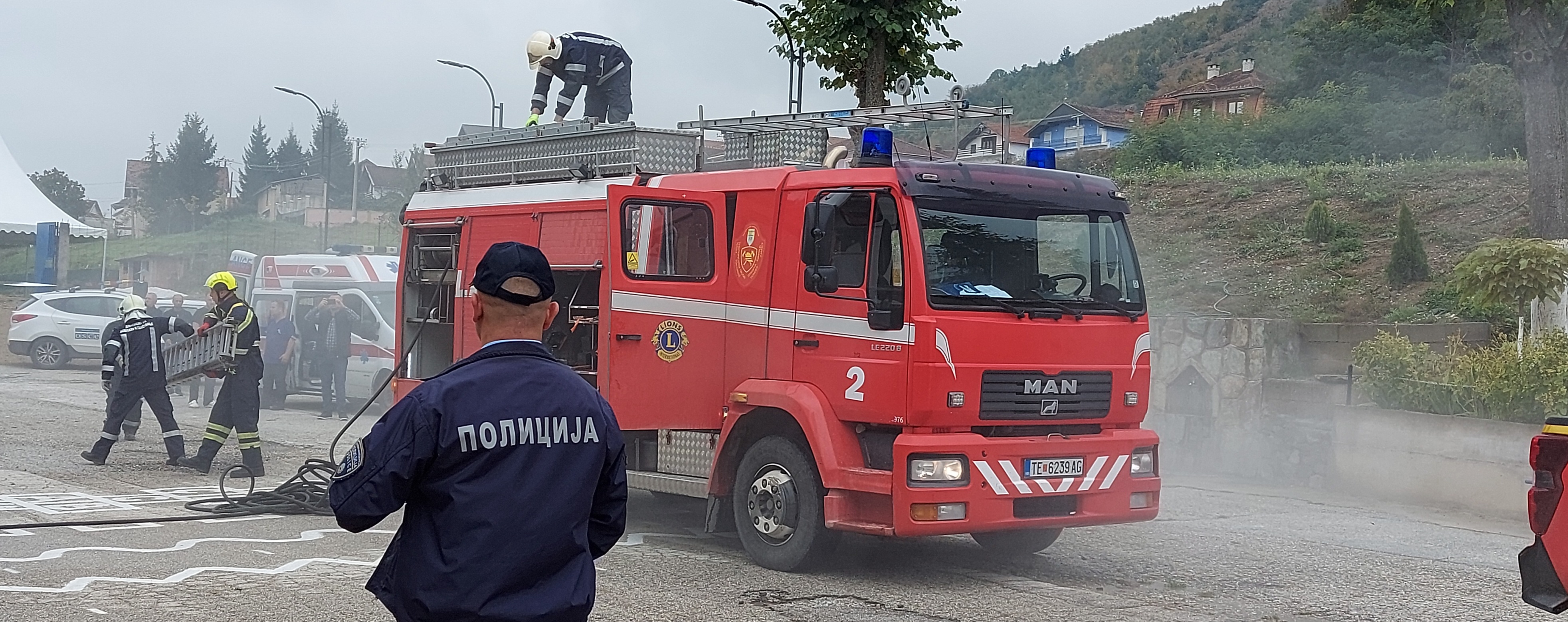Early warning can be the difference between life and death
October 13, 2022

How long do you have to escape before the disaster strikes? Is staff properly trained? Who is in charge? Do we have a response plan?
These are the most frequently asked questions related to disaster risk reduction, regardless of whether a fast-moving hazard is, or the one that creeps up over time. Anticipating the impact of potential hazard saves lives.
Today, marking the International Day for Disaster Risk Reduction, 180 students from Sami Frasheri Elementary School in the village of Pirok, municipality of Bogovinje, are learning this lesson through a drill as part of the "Improving resilience to floods in the Polog region" project financed by Switzerland, implemented by the United Nations Development Program and the Ministry of Environment and physical planning. Carefully planned and organized with the help of experts engaged by the project, the school, which has been under a threat of the landslide in the immediate vicinity, carried out a successful evacuation drill dealing with the risk of disaster and evacuation of students and staff, using equipment, evacuation maps, aids, signs, evacuation plans, prepared by the project team.
“Switzerland is dedicated to support the citizens of Polog region in building resilience to floods and other disasters. This is a long process, and I commend the bravery of youth to participate in such exercise and be willing to be prepared for future scenarios. Through this activity we aim to increase the capacity of institutions and the overall resilience of the community at risk to future disasters. Municipalities, institutions, and citizens in the Polog region must work together to create the enabling environment to enhance the accessibility to early-warning systems, thereby increasing the preparedness of the community and, not least, their protection.” pointed out Ambassador of Switzerland to North Macedonia Ms. Véronique Hulmann.,
In the drill, the first of its kind in the municipality of Bogovinje, in addition to the students and teachers from Sami Frasheri school, members of the Crisis Management Center, the Directorate for Protection and Rescue and representatives of the Red Cross were involved.
“This year International Day for Disaster risk reduction is about enhancing accessibility to early warning systems and risk information to everybody. We have chosen this exercise for this day to work with the youngest. Children should enjoy childhood and school days carefree, but to be prepared if needed. It is not enough for an early warning system to correctly identify an incoming hazard, but it must also ensure that the populations and sectors that are at risk can receive the alert, understand it, and most importantly, act on it. On this International Day for Disaster Risk Reduction, let us commit to cooperate to build a safer and more resilient world”, said Armen Grigoryan, UNDP Resident Representative.
"Engaging youth on the frontline of disaster risk reduction activities is important for building the preparedness capacities of the children and enhancing their disaster risk knowledge. They should also be aware of the risks and recognize them. Empowering children and youth is the world’s best chance of building resilient communities as they are the most vulnerable category and our agents of change in building resilient world", said Naser Nuredini, minister of environment and physical panning.
Bogovinje municipality is one of the nine municipalities in the Polog region, which was hit by floods on several occasions in the past, sometimes with human victims. In these municipalities, the project is working on introducing measures to improve flood resilience through top-down, institutional changes and strategies and bottom-up, local, community-based approaches, i.e., establishing an integrated approach and transformational changes through forming a common front of municipalities to fight floods and other type of disasters.
Between 1970 and 2020, more than 11,000 disasters were attributed to weather, climate, and water-related hazards, accounting for more than two million deaths and USD 3.64 trillion in losses. Careful planning, early warning systems, wetlands protection and restoration, investment in infrastructure, awareness raising and education, and lowering greenhouse gas emissions can reduce disaster risk.
Ambassador of Switzerland to North Macedonia Ms. Véronique Hulmann
Armen Grigoryan, UNDP Resident Representative

 Locations
Locations

